Author Archive
Eberly Center for Women to Host Virtual Event About Women and COVID-19
Wednesday, April 22nd, 2020“Women and COVID-19: Advancing Gender Justice Amidst a Pandemic” will be the topic of an online panel discussion 5:30 p.m. Thursday, April 23.
The Catharine S. Eberly Center for Women at The University of Toledo will host the virtual event.
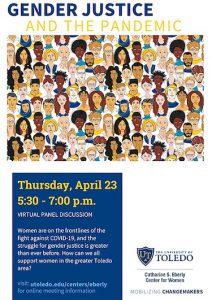 “The discussion will explore how gender, race, class and ability status shape women’s experiences with COVID-19 and the pandemic,” said Dr. Angela C. Fitzpatrick, director of the Eberly Center. “UToledo faculty and key leaders from the greater Toledo area will share what they are doing to advance gender justice and provide strategies for how we all can uplift women during this critical time.”
“The discussion will explore how gender, race, class and ability status shape women’s experiences with COVID-19 and the pandemic,” said Dr. Angela C. Fitzpatrick, director of the Eberly Center. “UToledo faculty and key leaders from the greater Toledo area will share what they are doing to advance gender justice and provide strategies for how we all can uplift women during this critical time.”
Panelists will be:
• Dr. Sharon Barnes, associate professor and chair of the UToledo Women’s and Gender Studies Department;
• Nina Corder, founder and managing director of Women of Toledo;
• Dr. Ally Day, UToledo associate professor of disability studies;
• Lisa McDuffie, president and CEO of YWCA Northwest Ohio; and
• Wendy Pestrue, CEO and president of the United Way of Greater Toledo. Join the virtual panel discussion on WebEx.
The meeting number is 476 036 323, and the meeting password is equity.
Need an Online Lesson For Your Child? Sign Up to Chat With a UToledo Astronomer
Monday, April 20th, 2020While The University of Toledo Ritter Planetarium is closed during the COVID-19 shutdown, parents and teachers can set up live chats for their children with an astronomer.
Dr. Michael Cushing, associate professor of physics and astronomy and director of Ritter Planetarium, is available to answer questions from home through Zoom, Skype and FaceTime with individual children or groups of children in elementary school.
“My wife and I have a 7-year-old daughter, so we understand that parents are looking for something educational and fun to do with their children stuck at home during the coronavirus pandemic,” Cushing said. “When I was a child – I was too shy to do it – but I would’ve loved nothing more than to talk to an actual astronomer. These kinds of interactions can really inspire a young person, and I hope that I can provide some of that inspiration by chatting with them about what it is like to be an astronomer.”
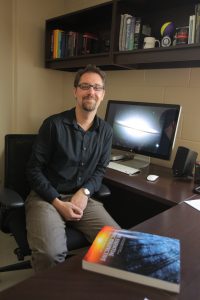
Dr. Michael Cushing
During virtual meetings, Cushing has fielded questions about shooting stars, planets, exoplanets, the rings around planets and even “Star Wars” movies.
“When chatting with one young girl, we spent about 10 minutes on ‘Star Wars’ after she asked why I wanted to become an astronomer,” Cushing said. “When I was four or five, ‘Star Wars: Episode IV – A New Hope’ was re-released in theaters, and watching that star destroyer come fly over me was a really impactful event in my life because I fell in love with all things space. I’m happy to talk more about ‘Star Wars,’ as well as answer questions about anything from aliens to the moon to black holes.”
To schedule a virtual session with Cushing, email him at michael.cushing@utoledo.edu or send him a message through Ritter Planetarium’s Facebook page.
Ritter Planetarium also is offering free programs that families can watch online: “Dinosaurs at Dusk,” “Birth of Planet Earth” and “Dynamic Earth.” Links to the videos are available at Ritter Planetarium’s website.
Engineering Students Making 3D-Printed Face Shields for Healthcare Workers
Wednesday, April 15th, 2020From his home a few minutes away from The University of Toledo campus, Nick Michael has cranked out 120 face shields and donated them to hospitals throughout the Toledo area to help medical personnel battling the COVID-19 pandemic.
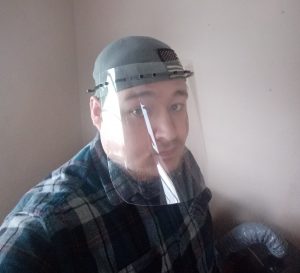
Nick Michael
The graduate student studying mechanical engineering is using two 3D printers and a laser cutter as part of his ad-hoc assembly line set up in a small room next to his bedroom.
“People need help, and I have the time and the materials,” said Michael, whose co-op working experience is in the automotive industry. “It’s the right thing to do.”
Meanwhile from his home office in Sylvania, fourth-year electrical engineering student Cameron McCaskey has built 84 face shields using his 3D printer.
Both engineering students say cleanliness and hygiene are the top priority throughout the entire process as they use 3D printers to make the frame – somewhat similar to a frame for sunglasses – and then attach a clear plastic shield to the arches.
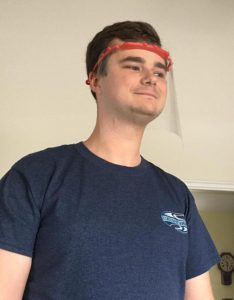
Cameron McCaskey
“I found the medical design specifications on the internet because I want to help,” McCaskey said. “It takes about 25 minutes to 3D print one frame. And then I use a three-hole puncher to make holes in the transparent sheet to connect it to the frame.”
They order the clear screens online, finding you can buy about 100 for $15.
“I wash my hands before I start and wear a visor,” said Michael, who averages about five frames an hour using both 3D printers. “With the frames, I do an acetone dip. It melts the outer surface and closes them up so there’s no gaps. Then I wash them with soap and water.”
Though this is their first foray into fabricating medical supplies, they say all engineers are problem-solvers and have the skills to follow the guidelines for personal protective equipment during this public health emergency.
“People have a misconception about 3D printing,” Michael said. “The files are already out there. You load them onto a pre-built slicing program. It’s not that hard to run.”
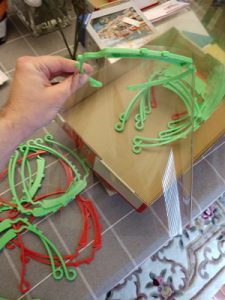 Michael and McCaskey are donating their face shields to the local chapter of Masks for Docs, which is led by UToledo medical students.
Michael and McCaskey are donating their face shields to the local chapter of Masks for Docs, which is led by UToledo medical students.
“I am always proud and impressed by what our engineering students accomplish in their classes and on their own time,” Dr. Mike Toole, dean of the College of Engineering, said. “The students’ work epitomizes what we are trying to accomplish in the College of Engineering in instilling an entrepreneurial mindset. Students focus not just on problem-solving, but on creating value for a customer. In this case, the customers are our regional healthcare workers, who deserve our
thanks and our help. Our initiatives in entrepreneurial-minded learning are made possible thanks to Tom and Betsy Brady, founders of Plastics Technology Inc., and our recent partnership with the Kern Entrepreneurial Engineering Network.”
UToledo Launches COVID-19 Emergency Support Crowdfunding Campaign to Help Students
Tuesday, March 24th, 2020As the world grapples with the growing coronavirus pandemic, The University of Toledo has created a fund to assist students during this unprecedented time.
Rocket nation is asked to consider donating to the COVID-19 Student Emergency Support Crowdfunding Campaign.
The University of Toledo Foundation is partnering with the UToledo Division of Student Affairs with a goal to raise $30,000 by the end of the fiscal year. The campaign collected $10,000 in a matter of hours after launching, and, as of March 23, more than $20,000 has been raised.
“The outpouring of support since this fund launched has been amazing,” UToledo President Sharon L. Gaber said. “We want to thank alumni, faculty, staff and friends of the University who are coming together to assist our students. We are Rockets helping Rockets.”
“So many UToledo students are being impacted by this new reality we are living,” Dr. Phillip “Flapp” Cockrell, vice president for student affairs and vice provost, said. “Within a week, 1,159 of our students can no longer work on campus, and 125 students are not able to return home to their native countries.”
“Gifts through this campaign will alleviate some financial stress and worries for UToledo students who are struggling to maintain basic needs,” said Dr. Michele Soliz, associate vice president for student success and inclusion.
This online giving campaign will provide emergency relief for students in need. Donations will help students facing financial hardships pay for housing, utilities, car repairs, medical bills, food and toiletries.
“Together, we can make a difference for our UToledo students,” Cockrell said. “Gifts of any amount will be appreciated.”
Make a donation and learn more about the drive on the COVID-19 Student Emergency Support Crowdfunding Campaign website.
UToledo students can apply for up to $500. For details, go to the Division of Student Affairs website.
“We encourage students in need to apply for help,” Soliz said. “We will review applications and work with the Office of Financial Aid to distribute funds.”
UToledo adopts test-optional admissions for prospective students
Wednesday, March 18th, 2020The University of Toledo will begin using a test-optional admissions model for aspiring Rockets to expand access to a high-quality college education during the global coronavirus (COVID-19) pandemic.
University leaders have been discussing the policy change and are moving forward with a pilot program now as high schools and testing centers across the country are closing to help stop the spread of coronavirus. Some states, including Washington and Texas, have announced canceling standardized testing requirements.
“These are unprecedented times, and it is critical that we innovate and provide flexibility,” UToledo President Sharon L. Gaber said. “In addition to helping prospective students and their families during this current uncertainty, we are looking at test-optional admissions as an opportunity to expand access to a high-quality college education, enhance opportunities for academic excellence and increase socioeconomic diversity.”
Additional flexibility will be implemented in the short term amid the closures during the coronavirus outbreak.
“Given the limited opportunity for high school students to access transcripts, AP exams, ACT testing and SAT testing, UToledo is moving to a test-optional model,” Jim Anderson, vice president of enrollment management, said. “We will use self-reported grades and high school GPA to conditionally admit students until final transcripts are available.”
A student may choose to submit their SAT and/or ACT score(s) if they believe it will be a benefit in the admissions review process. However, the University will evaluate each applicant based on the path they choose. If they prefer not to use a test score, the University will consider a more holistic, robust view of their record, including high school grade point average and community participation, in the admissions review process.
While there may be some exceptions for specific scholarships or highly competitive programs, the new trial period of the test optional admission policy aims to encompass more diverse predictors of college success and attract students from a wide variety of backgrounds who perform well in the classroom but may not perform well on standardized tests.
Students who are home-schooled or attend high schools that do not provide grades do not qualify to be test-optional.
As evidence has shown that standardized test scores are not the best indicator of a student’s potential, this innovative admissions approach is gaining momentum across the country with more than 1,000 U.S. colleges adopting the practice, according to the National Center for Fair & Open Test.
UToledo has a longstanding commitment to educational accessibility and student success. The University’s continued investments in student support services and the dedication of success coaches and academic advisors are reflected in the highest undergraduate fall-to-spring retention rate in at least 12 years and the University’s most recent record high six-year graduation rate.
For more information, visit utoledo.edu/admission/freshman/test-optional-test.html.
UToledo, TPS Partner on New Location for Toledo Early College High School
Tuesday, March 10th, 2020The University of Toledo and Toledo Public Schools are partnering to renovate Driscoll Center to be the new location for Toledo Early College High School (TECHS).
Join UToledo President Sharon L. Gaber and TPS Superintendent Romules Durant on an early construction tour at 1 p.m. Wednesday, March 11 at the Driscoll Center, located on the corner of West Bancroft Street and University Hills Boulevard.
UToledo and TPS approved in December a long-term lease agreement to move Toledo Early College from its current location on the Scott Park Campus. This will bring students closer to Main Campus and provide more opportunities to experience the college atmosphere.
TECHS is a college preparatory program for students in 7th to 12th grades that focuses on college readiness with curriculum designed to accelerate students into college courses at UToledo. More than half of the high school graduates go on to continue their education at UToledo.
The $3.5 million renovation underway on the two-story building, which is jointly funded by UToledo and TPS, will create 20 classrooms and a dining and multipurpose room with a prep kitchen. The 300-seat auditorium will remain for school assemblies and other large events.
TECHS plans to be in the new location for the 2020-21 academic year.
State awards UToledo $474,287 for equipment to train students in autonomous-vehicle technology
Friday, February 28th, 2020The state of Ohio awarded The University of Toledo a $474,287 grant to purchase new state-of-the-art equipment to train students in the areas of autonomous vehicle-sensing technologies, robotics and vision-based systems for automation.
The grant is part of $975,000 in funding in the region and $8 million across the state announced by Ohio Governor Mike DeWine this week through the Department of Higher Education’s Regionally Aligned Priorities in Delivering Skills (RAPIDS) program for universities, community colleges and technical career centers to collaborate to enhance education and job preparedness in a variety of fields of strategic importance for the state’s employers.
One of the state’s nine regions, UToledo’s group – a consortium that includes three universities, six private and community colleges, and two career and technical centers – is focused on working together to share new equipment and curriculum in the field of robotics and autonomous vehicles.
“The RAPIDS program awards offer a unique opportunity for Ohio’s postsecondary educational institutions and employers to help address local workforce needs,” DeWine said. “Students are able to gain access to top-notch equipment that helps better prepare them for available jobs.”
“This investment focused on advanced manufacturing and cybersecurity in autonomous vehicles will significantly benefit students in our new graduate certificate program in vehicle mechatronics that we launched in collaboration with Dana Inc.,” Dr. Mike Toole, dean of the UToledo College of Engineering, said.
Equipment is shared among campuses, allowing more students to get a quality education more affordably.
“When businesses and our higher education institutions are asked to work together to develop strategic plans for using these funds, it provides students with more opportunities for success while strengthening the regional workforce and Ohio’s economy,” Chancellor Randy Gardner, chancellor of the Ohio Department of Higher Education, said.
The RAPIDS program was launched in 2014.
UToledo Sorority to Promote Reading With Book Giveaway Feb. 29
Thursday, February 27th, 2020The Toledo Area Alumnae Club of Pi Beta Phi Fraternity for Women will host one of six book giveaways in the country to promote reading and literacy this weekend.
UToledo Pi Beta Phi sorority members will distribute 20,000 books to local children and schools from 9:30 a.m. to 3:45 p.m. Saturday, Feb. 29 in the Thompson Student Union Ingman Room.
The fraternity day of service is made possible thanks to First Book, a nonprofit with a mission to provide books to children from low-income families.
“Only six cities in the United States host fraternity day of service, and we are just so unbelievably honored to be one of the cities,” Natalie Baxter, UToledo junior majoring in nursing and Pi Beta Phi president, said.
More than 150 volunteers from campus and the community will help distribute the books, which are suitable for children and teens.
“Pi Beta Phi believes that reading is a gateway to all of the many opportunities that are offered in the world. Reading takes you places, transforms you, and makes you feel empowered,” Baxter said. “Pi Beta Phi believes that when there is one child that can’t read, that is one child too many. If we just show one child all the amazing things reading has to offer, we have done what we have set out to do.”
UToledo Launches New Degrees in Data Science and Analytics
Tuesday, February 25th, 2020Due to skyrocketing demand from employers for data-savvy professionals, The University of Toledo is offering two new undergraduate degrees in data science and analytics.
Beginning in fall 2020, the University will debut a bachelor of arts degree in data analytics in the College of Arts and Letters, and a bachelor of science degree in data science in the College of Natural Sciences and Mathematics.
“The ability to interpret large quantities of data, translate insight and understand broader implications is critical to success in modern organizations throughout every industry,” Dr. Karen Bjorkman, provost and executive vice president for academic affairs, said. “These degrees will give our students a competitive edge in our rapidly changing economy driven by big data and the increasing exchange of information as part of our everyday life and culture.”
Employment in data science is expected to grow nearly 20% between 2016 and 2026, according to the Bureau of Labor Statistics.
The undergraduate programs prepare students for employment in positions dealing with big data and data analysis in nonprofit, government and business environments. They share a core set of courses in econometrics, geographic information systems, data visualization and ethics.
UToledo is enrolling students to start in the fall semester who are interested in learning how to make informed, mathematically valid and ethically sound decisions based on the analysis of data.
The bachelor of arts degree in data analytics has an emphasis on social sciences and will prepare students for careers that focus on interpreting and applying structured data for clients who can use the data to make decisions.
Taking an interdisciplinary approach, the data analytics degree draws on the wide range of expertise in the College of Arts and Letters, from the social sciences to philosophy and visual arts. It includes courses in social statistics and quantitative research methods; computer science and engineering technology; and research and writing for different audiences.
“Focusing on important social, behavioral and cultural contexts, this experience will empower students to better understand the results of their work and to better communicate those results to their employers, policy makers or others in need of the information, especially nonprofit organizations who desperately need individuals trained to use data effectively in order to better leverage their resources as they work to solve challenging problems,” Charlene Gilbert, dean of the College of Arts and Letters, said.
The bachelor of science degree in data science is designed to prepare students for careers that involve statistical tools to extract meaning from large data sets for specific applications. It includes courses in calculus; statistics and probability; object-oriented programming; and machine learning.
The data science degree emphasizes the analysis of data in the applied sciences with training in math and computer science to develop data from different sources and apply the results in fields ranging from astronomy to the environment to human health and beyond.
“In the past few years, our ability to collect detailed data has dramatically expanded, impacting every area of modern life,” Dr. John Plenefisch, interim dean of the College of Natural Sciences and Mathematics, said. “However, our ability to extract useful information from this sea of data has lagged because we simply don’t have enough data scientists. This new degree program will help out students gain the knowledge, skills and experience that will position them to succeed in this expanding career area.”
Beyond the undergraduate degrees, UToledo also offers master’s degree programs in business analytics in the College of Business and Innovation; a minor in data science in the College of Health and Human Services; a minor in data analytics in the College of Arts and Letters; and a concentration in data science in mathematics in the College of Natural Sciences and Mathematics.
UToledo Student Becomes First Black Editor-in-Chief of 52-Year-Old Law Review
Monday, February 24th, 2020Second-year law student Damon Williams made history as he was selected to be the next leader of The University of Toledo Law Review.
Williams will be the first black student to hold the prestigious position of editor-in-chief in the publication’s 52-year history.
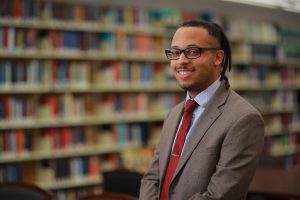
Damon Williams
“I am extremely grateful for the opportunity that I have been afforded,” Williams said. “Becoming the first editor-in-chief with African-American heritage is an amazing milestone, and I am beyond honored.”
The law review, which was first published at the UToledo College of Law in 1969, is a student-run journal written by law professors, judges and students.
“I am delighted that Damon was selected as editor-in-chief of The University of Toledo Law Review,” D. Benjamin Barros, dean of the College of Law, said. “He’s exceptionally bright and will be an excellent leader. Although we wish this milestone would have happened sooner, his selection is encouraging as it reflects progress.”
“This is but a step in, what I hope to be, a continuing process for The University of Toledo,” Williams said. “I am striving to help foster subsequent diversity milestones and continued Law Review success, and I look forward to my future collaboration with community members.”
Law review members are selected as editor-in-chief after a highly-competitive, in-depth interview process. The elections committee considers academic performance, writing ability as demonstrated by their academic writing and editing throughout the year, and leadership potential.
“From a technical perspective, Damon’s formal yet graceful writing style and his superior academic performance made him a competitive candidate among his peers,” said Lindsey Self, law student and the current editor-in-chief of The University of Toledo Law Review. “He demonstrates conviction in his vision for the journal but is unafraid to take calculated risks. Damon’s writing and leadership demonstrate a unique balance between sensibility and practicality with inventiveness and ingenuity – a balance that is difficult to find in practice, let alone law school.”
Williams, who also serves as president of the Black Law Students Association, was born and raised in Toledo. He earned his bachelor’s degree in criminal justice and master’s degree in forensic science at Bowling Green State University.
He hopes his law degree will help him facilitate the social and political changes he wants to see in the world. Although he is still figuring out his next steps, Williams is considering a federal clerkship or doctor of juridical science.
“This is much bigger than me alone,” Williams said. “I have a fantastic executive board in Hayley Mise, Cameron Morrissey, Kate Murray and Morgan Isenberg. Their continued excellence and support are essential to the success of the law review. In addition, Lindsey Self has been a shining north star, guiding me toward the path to success.”

